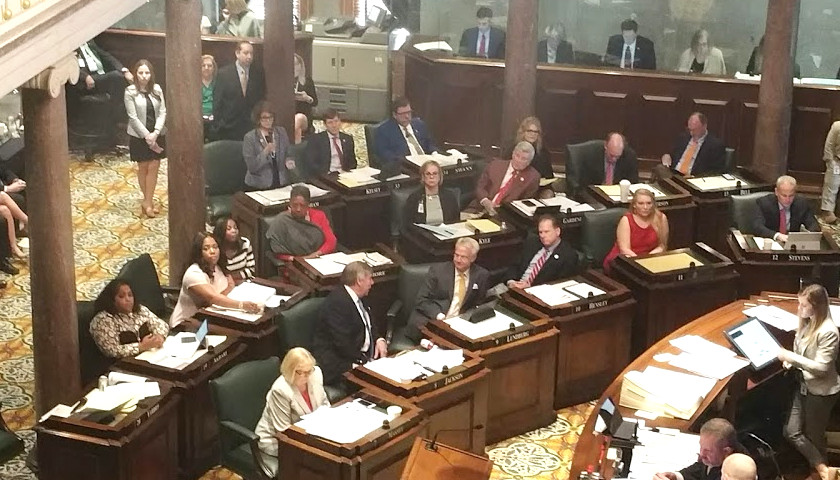NASHVILLE, Tennessee – Governor Bill Lee’s most significant – and controversial – education initiative of Education Savings Accounts passed in the State Senate Thursday with a vote of 20 Ayes and 13 Nays.
As The Tennessee Star reported, President Trump tweeted his support for the measure Wednesday evening, the day after the Tennessee House narrowly passed the Education Savings Account (ESA) initiative amidst high drama by a vote of 50 Ayes and 48 Noes.

Prior to addressing the ESA bill as the first item on the Senate’s regular calendar or even taking a roll call, newly-elected Senator Bill Powers (R-Clarksville) was formally introduced to his colleagues on the Senate floor by Majority Leader Jack Johnson (R-Franklin).
Johnson, in his introduction of Powers, told Senate members that Powers had earlier taken his oath in the Governor’s office.
Powers was elected on Tuesday through a special election to replace former State Senator Mark Green, who was elected as the U.S. Congressman of the 7th District in November 2018.
Votes cast in the special election totaled 12,051, according to the unofficial election results submitted by county election commissions to the Tennessee Coordinator of Elections, Mark Goins, and posted on the Tennessee Secretary of State’s website. Powers took 54 percent with the Democrat, Janita Charles, taking 44 percent and the remaining 2 percent going to two Independent candidates.
HB 0939 was substituted for SB 0795, followed by maneuvering four amendments to then get to the fifth amendment which would make the bill and create the “Tennessee Education Savings Account Pilot Program.”
Senator Dolores Gresham (R-Somerville), who is also the Chair of the Senate Education Committee, carried the legislation and successfully guided its passage through that Committee on April 10 with a vote of 6 Ayes and 3 Noes, as reported.
Senator Gresham said the program will provide opportunities for students zoned to attend schools in Metro Nashville and Shelby County and the Achievement School District.

Reading from her prepared comments, Gresham began her presentation, “The most local control is when parents make those kinds of decisions around the kitchen table. This is particularly true for students in areas with multiple lower performing schools and limited high-quality education options. High-quality education options is a priority of this Governor, because he has seen first hand the impact that quality choices in the education space can have on a student.”
While Gresham used much of her compelling arguments from the Education Committee, she digressed from her prepared comments to share what some of the priority schools look like in terms of outcomes.
As Gresham pointed, the information is available on the State Department of Education website, along with the state averages for the most recent school year of 2016-2017 which includes an average ACT composite for math, reading, English and math score of 20.1 of a range of 1 to 36 and an average graduation rate of 89.1 percent.
- Geeter Middle School, Shelby County – 5.5 percent of students are on track in English; fewer than 5 percent are on track in math
- Pearl-Cohn High School, Davidson County – 6.1 percent of students are on track in English; fewer than 5 percent of students are on track in math; the average ACT score is 16; the graduation rate is 79.9 percent
- White’s Creek High School, Davidson County – fewer than 5 percent of students are on track in either reading or math; the average ACT score is 15.5; the graduation rate is 76.5 percent
- Stratford STEM Magnet School, Davidson County – fewer than 5 percent of students are on track in either reading or math; the average ACT score is 16.7; the graduation rate is 78.2 percent
- Trezevant High School, Shelby County – fewer than 5 percent of students are on track in reading, math or science; the average ACT score is 14.7; the graduation rate 64.4 percent
“Ladies and Gentlemen, when we talk about priority schools and failing schools where children are languishing, that’s what we’re talking about and that’s what’s happening,” Gresham pointed out.
“The Governor is committed to improving the education results of all our state students,” Gresham continued, deliberately and emphasizing each word, “and this program will help kids that need help the most.”
Gresham explained that ESAs are one piece of the Governor’s top priority which is to improve our schools and get our state out of the bottom half of schools nationally. Other pieces included funding for teacher pay raises, fully funding and investing in public schools and increasing access to vocational, technical and agricultural education opportunities for students.
Addressing the contents of the bill, Gresham said that the program will allow students currently zoned in Davidson County and Shelby County as well as the Achievement School District (ASD), most of which are located in those two counties.
The pilot program being discussed is different than that passed by the Senate Education Committee in that:
- Hamilton, Knox and Jackson-Madison County are no longer included;
- homeschoolers will be included but must operate under an umbrella program approved by the State Department of Education and that requires an accountability measure of appropriate testing. If the umbrella organization happens to be the Local Education Agency (LEA), they will administer the TN Ready testing;
- income eligibility requirement remains as twice the eligibility for the federal free lunch program, but income verification will be required on the initial application via pay stubs, W-2 or income tax returns and must be re-verified every three years;
- enrollment will be capped at 7,500 students per district with a total maximum participation of 15,000 students;
funding is set at the statewide average of the state and local per pupil amount under the BEP (Basic Education Program) of $7,300; - it does not include verify immigration status of parents;
- requires English and math portions of the TCAP;
- includes robust reporting requirements to the General Assembly by the Comptroller’s Office of Education Research and Accountability.
In addressing the concerns of fraud in the program, Gresham said in the current ESA program for disabled students, debit cards are restricted by where they can be used. Additionally, North Carolina is using software that almost completely eliminates the chance of fraud, said Gresham.
“Ladies and Gentlemen of the Senate,” reassured Gresham, “this is not a bill aimed at hurting schools, but indeed at helping children.”
As such, at the same time the proposal offers opportunity, it is providing investment to public schools through a three-year grant that is equal to the amount in the ESA and will then be converted to grants for priority schools across the state, explained Gresham.
Discussion on the amendment began with Senator Joey Hensley (R-Hohenwald), through a series of questions and answers, confirming that the only way the program can be expanded to other districts or the number of students is with future approval by the Tennessee General Assembly.
Senator Steve Dickerson (R-Nashville), whose district would be affected by the program, opposes the proposed legislation.
Freshman Senator Paul Rose (R-Tipton and part of Shelby County) clarified with Senator Brian Kelsey (R-Germantown) that municipal school districts within Shelby Country are not included in the program.
To Rose’s question of how much in the way of funding above and beyond the ESA program has been budgeted for education, Kelsey responded that the $117.5 million demonstrates Governor Lee’s dedication to funding public schools.
After Senator Janice Bowling (R-Tullahoma) told of her home school experience and related it to those who could benefit from the ESA program today, Nashville Democratic Senator Jeff Yarbro questioned Gresham about the Department of Education report she referenced earlier.
Yarbro offered a list of numerous other school districts that have higher numbers of economically disadvantaged students and not meeting college standards when leaving high school.
Gresham responded that the goal is to reach into the highest concentrations of economic poverty and lowest performing schools.
Yarbro also questioned the need for experimenting with choice in districts that actually have more choices through various charter options, magnet schools and zone schools.
Senator Rusty Crowe (R-Johnson City) said, “It does both,” when it comes to whether the program fixes the schools or help a few students.
Representative turned Senator in the 2018 election, Raumesh Akbari (D-Memphis) had much the same concerns as Yarbro with regard to the number of school choice options already available in Shelby County. Akbari talked of the successes the district has had, including with an I-Zone program that enabled 17 of 23 schools to exit the priority school list and would like to see additional investment in such homegrown programs.
Freshman Senator Katrina Robinson (D-Memphis), relayed the story of her son who left public school on a scholarship to a private school as a very high performing student. The experience ended up being a less than satisfactory, and he returned to public school. She later shared statements from other students who attended the school, which she felt was not isolated.
Without some changes to the program like start and end dates, achievement parameters, and triggers to determine if the program is working, “Otherwise it’s not a pilot program, it’s a predatory program,” concluded Robinson.
Kelsey, a co-sponsor on the bill, rose in support of the bill, sharing his personal story of attending private school and the huge difference it made in his life.
As Governor Phil Bredesen put a spotlight 10 years ago on Shelby County schools, and they responded, Kelsey said it’s now time for Governor Lee.
Kelsey also relayed that while the state’s average ACT score is 20.1, the average score in Memphis is 13.9. And, Kelsey added, a teacher told him that if a student selects “C” as the answer to every question on the ACT, they would score a 12.
In conclusion, Kelsey said he applauds Governor Lee for giving the thousands of children that desperately need help the opportunities they need for a high-quality education.
By voice vote, the amendment that makes the bill was adopted and then another amendment was presented by Finance, Ways and Means Chairman Bo Watson (R-Hixson). In addition to making technical and spelling corrections – which Watson said, in an attempt at humor, shouldn’t be on an education bill – made three important changes:
- clarified the annual calculation of the statewide average of state and local BEP allocations per pupil;
- clarified the third year school improvement fund that will go to any school listed as a priority school; and
- that the Tennessee Value-Added Assessment System (TVAAS) used to determine student achievement growth for the participating ESA schools will be made publicly available on the State Department of Education’s website.
On one of his earlier amendments that he rolled to the heel and said he would now withdraw, Dickerson made a few comments. Dickerson thought that if it is a really good bill, it should be embraced for every county.
Dickerson claimed that in the chamber down the hall, referring to the House, the 50th vote came with the specific stipulation that this bill would not apply to the 50th vote’s county. He also claimed that it also came “with a significant financial reward for that individual’s county,” if reports are to be believed.
Dickerson worried that it is very unfair, that this is not the way that we should be doing our business and that it comes down to a victory at any cost.
Yarbro was disappointed that Dickerson’s amendment wasn’t voted on, because he thought it would be useful to know who wants it in their district. Going from five counties to two counties is the only way it got to the Senate floor, said Yarbro. “This is the good idea of the year, and no one in this chamber is supporting this for all of the students they represent.”
Yarbro talked about how he thought the program will be expanded, as has been said by various people and evidenced by other states.
Rose expressed appreciation for Governor Lee, Senator Gresham, Senator Kelsey and the Education Committee for their hard work. After relaying that nobody has offered him any favor for his vote, which he hasn’t shared “with a single sole,” including his wife.
He also expressed disappointment for the misinformation that has been spread about the bill.
While he said this legislation is not a silver bullet and that every decision he would make would be what’s best for the children, Rose then relayed the well-known starfish story which may summarize the whole point behind the bill.
Senator John Stevens (R-Huntingdon) stood in support of the legislation, because he supports choice.
He read a lengthy and well thought out statement, which made several references about education through quotes by the founding fathers and C.S. Lewis as well as “five unelected lawyers” on the U.S. Supreme Court that changed education.
Senator Kerry Roberts (R-Springfield) was followed by Senator Ferrell Haile (R-Gallatin) who told a touching story of his son who was born at two pounds, two ounces, how they dealt with his learning disability and how successful he is now.
As part of her closing, Senator Gresham said she can’t do anything about the other states that were referenced, but she might be able to do a little in Tennessee, which is her home. She also believes in public education as, what she called, “the backbone of our state.”
Voting Aye were Senators Mike Bell (R-Riceville), Janice Bowling (R-Tullahoma), Rusty Crowe (R-Johnson City), Todd Gardenhire (R-Chattanooga), Dolores Gresham (R-Somerville), Ferrell Haile (R-Gallatin), Joey Hensley (R-Hohenwald), Ed Jackson (R-Jackson), Jack Johnson (R-Franklin), Brian Kelsey (R-Germantown), Jon Lundberg (R-Bristol), Mark Pody (R-Lebanon), Bill Powers (R-Clarksville), Shane Reeves (R-Murfreesboro), Kerry Roberts (R-Springfield), Paul Rose (Tipton and part of Shelby County), John Stevens (R-Huntingdon), Bo Watson (R-Hixson), Dawn White (R-Murfreesboro) and Speaker Randy McNally (R-Oak Ridge).
Voting No were Senators Raumesh Akbari (D-Memphis), Paul Bailey (R-Cookeville), Richard Briggs (R-Knoxville), Steve Dickerson (R-Nashville), Brenda Gilmore (D-Nashville), Sara Kyle (D-Memphis), Becky Massey (R-Knoxville), Frank Niceley (R-Strawberry Plains), Katrina Robinson (D-Memphis), Steve Southerland (R-Morristown), Art Swann (R-Maryville), Ken Yager (R-Kingston) and Jeff Yarbro (D-Nashville).
Since the versions passed by the House and Senate differ, a conference committee will need to be appointed by the Speaker of each body in order to reach a compromise.
On that process, Tennessee Star political editor, Steve Gill opines, “The passage of the ESA/voucher plans in both the House and Senate advances Governor Bill Lee’s top legislative priority, but now the different versions have to be aligned in consultation between the two Legislative bodies. Ultimately, the final bill will likely look more like the Senate version, with the approach being a ‘pilot’ program initially limited to Davidson and Shelby counties. Because of the extremely narrow vote in the House, that is where the final battle over details will be fought, but it is unlikely that any of those who voted for the more aggressive House version will balk at the Senate version — particularly as Governor Lee continues to twist arms.”
– – –
Laura Baigert is a senior reporter at The Tennessee Star.
Background Photo “Vote Count” by Randy McNally.






[…] different language that that passed by the House. After much less drama and by a wider margin, as reported, SB 0795 passed in the Senate with a vote of 20 to […]
Sure wish that the House version would be adopted. the watered down Senate version is a poor first step. I wonder how much influence the TEA wielded in the voting.